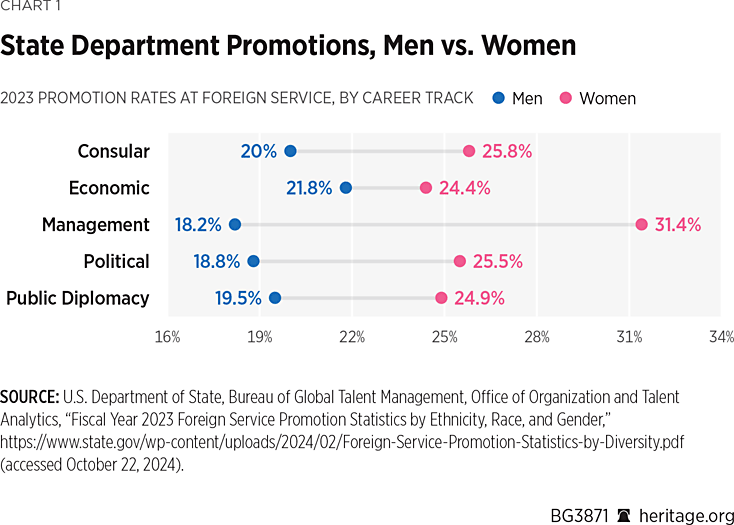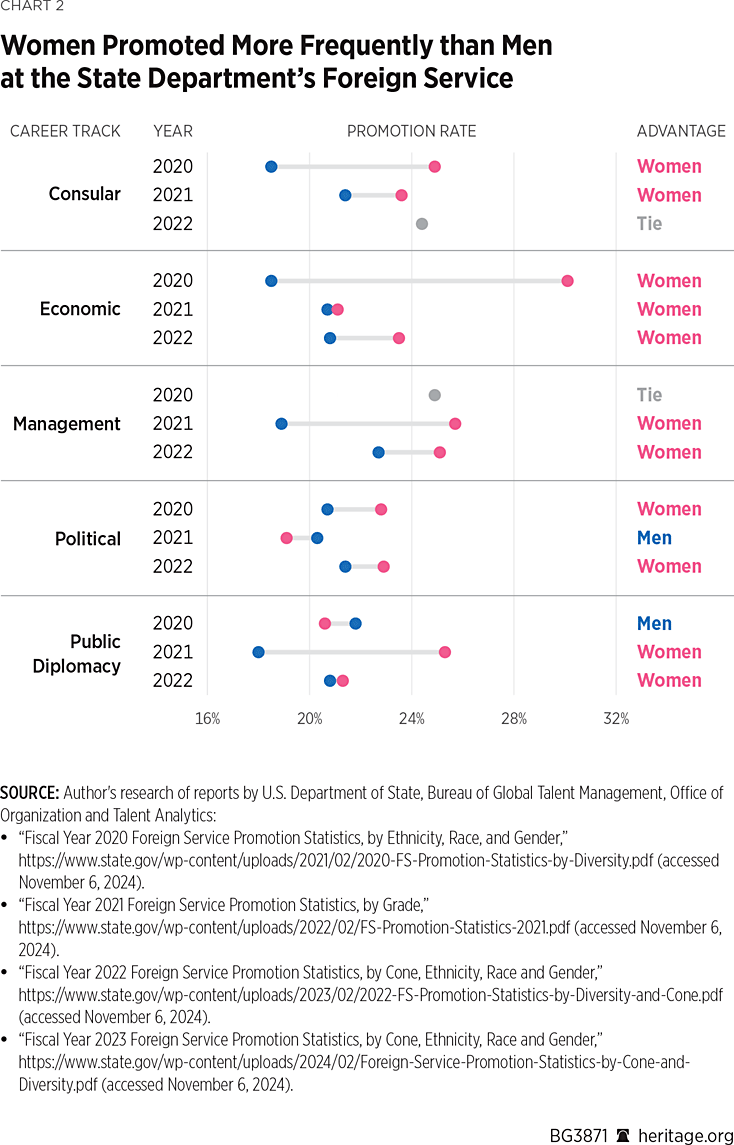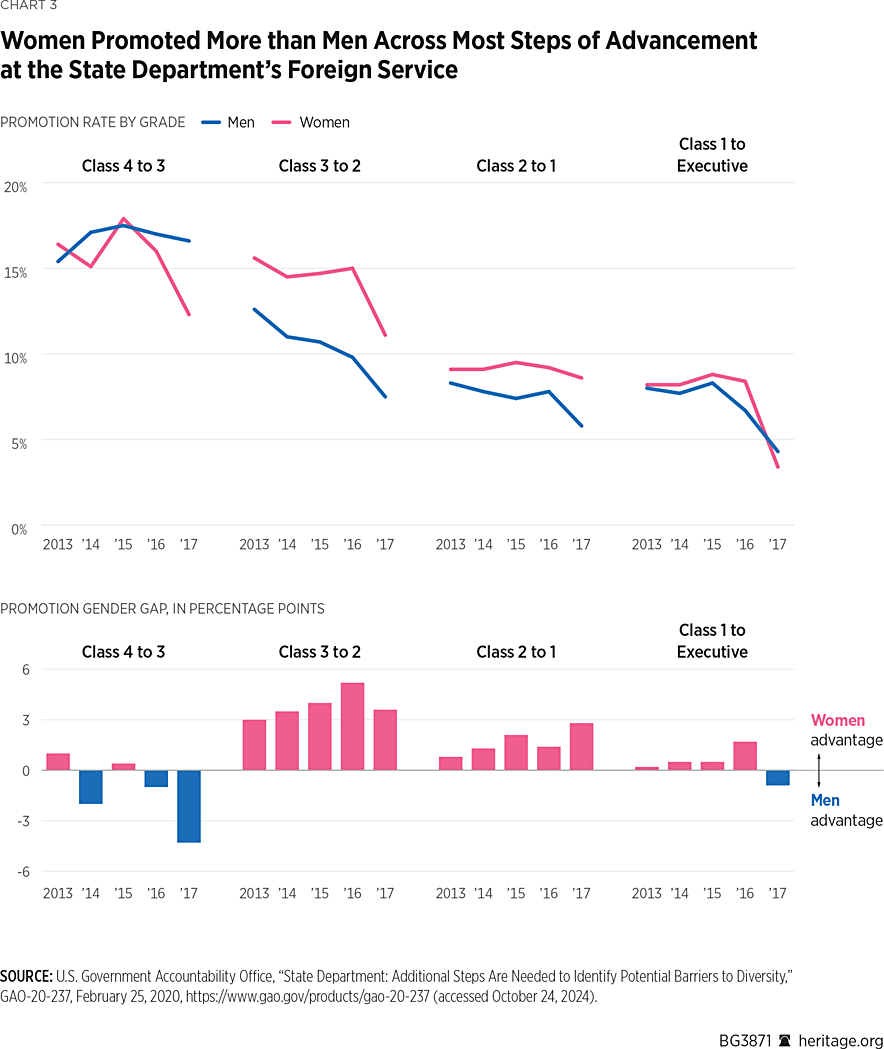A philosophy has taken hold of American institutions that rejects meritocracy and advocates preferential treatment based on race, sex, and even “gender” identity. Since 2021, “[t]he [Biden] administration has abandoned the old notion of equality in favor of a pseudo-Marxist ideology that condemns the United States as a fundamentally racist country, an evil that can only be corrected through the forced equalization of outcomes,” observes Chris Rufo of the Manhattan Institute. In pursuit of this goal, “the federal government…has dispensed billions of dollars toward building a DEI [diversity, equity, and inclusion] regime spanning government, academia, medicine, and contracting.”
Under the traditional American value of equal opportunity, the goal is that everyone gets a fair chance to compete, and that the best candidate, based on merit, comes out on top. The goal of “equity,” in contrast, is a guaranteed equal outcome. Vice President Kamala Harris explained the philosophy behind “equity” in 2021, saying “if the goal is truly about equality, it has to be about a goal of saying everybody should end up in the same place.”REF
To achieve “equity,” the logic of this approach implies, organizations must discriminate for favored groups—and against disfavored groups. Boston University academic Ibram X. Kendi believes, in a philosophy also promoted by pop author Robin DiAngelo, that the only possible explanation for disparity between races is white racism—all other variables notwithstanding. Therefore, they argue, discrimination against whites is now permitted, even necessary. As Kendi explained, “[t]he only remedy to past discrimination is present discrimination. The only remedy to present discrimination is future discrimination.”REF
Under the Biden Administration, the Kendi standard regarding race has been extended to sex. Assistant Attorney General Kristen Clarke of the Department of Justice’s Civil Rights Division, for example, claims that “[t]he underrepresentation of Blacks and women in law enforcement undermines public safety.”REF In one of several similar actions, her office sued Maryland’s State Police for using a physical Functional Fitness Assessment Test (FFAT) to screen applicants, a test that the Justice Department argued did “not meaningfully distinguish between applicants who can and cannot perform the position of Trooper” and so violated Title VII of the Civil Rights Act of 1964.REF
As Nellie Bowles of the Free Press puts it, “the new standard for the Justice Department is that any outcome that produces different results along race or sex lines must be inherently racist or sexist.”REF
Like the Justice Department, the State Department enthusiastically took on “equity” as a central organizational tenet, as part of its new diversity, equity, inclusion, and accessibility (DEIA) ethos. The State Department implements DEIA not as a corrective mechanism for any current injustice, but to implement current discrimination based on a person’s immutable characteristics.
Women in the Foreign Service
At the State Department, married women were not allowed to join the Foreign Service until 1972, and impediments to promotion lingered decades after. However, there is no evidence that bias exists now against female officers. Today, not only are women promoted at higher rates than men, but they are more likely to be chosen for prestigious jobs, such as staff assistants to department leaders, positions in the Secretary of State’s office, and Deputy Chiefs of Mission overseas. In turn, these sought-after jobs and the high-profile work that accompanies them are often viewed positively by promotion panels as factors in promotion, in a virtuous cycle that lifts selected officers in an invisible fast lane to success.REF
The Department of State’s Foreign Service, which comprises the bulk of America’s professional diplomatic corps, splits into generalists and specialists. Specialists are hired for specific skill sets (such as medicine, diplomatic security, and information technology) through a separate system. Generalist officers enter the Foreign Service by taking the written Foreign Service Officer Test (FSOT) and, if “invited” by a Qualifications Evaluation Panel,REF taking a subsequent Foreign Service Officer Assessment (FSOA). Formerly called the Oral Exam and held in-person in the Washington, DC, area, the FSOA is now “offered exclusively online from anywhere in the U.S. and many overseas locations.”REF There are also fellowship programs that allow entry into the Foreign Service, while waiving the FSOT altogether and permitting multiple (possibly unlimited) chances to pass the FSOA.REF In this Backgrounder, “Foreign Service officers” refers to generalists only.
Foreign Service officers are divided into five occupational concentrations, formerly known as “cones” and now as “career tracks”: Consular, Economic, Management, Political, and Public Diplomacy.REF The State Department publishes promotion tables every year, separated by career track, sex, and race.
As Chart 1 shows, the 2023 promotion rates for Foreign Service officers shows higher rates of promotion for women than men.REF

This promotion advantage in favor of women exists in all five Foreign Service career tracks, ranging from 3 percent for Economic officers to 13 percent for Management officers. In the case of Management officers, nearly one in three women were promoted compared to fewer than one in five men in 2023. Female Management officers thus had a 53.22 percent higher chance of being promoted than male officers.
Discrimination Against Men Lasting Decades
The year 2023 is no anomaly. According to a Government Accountability Office (GAO) report, analysis of promotion data from 2002 to 2018 “controlling for factors other than gender that could influence promotion, found that women in the Foreign Service had higher adjusted rates of promotion and higher odds of promotion than men in early to midcareer.”REF The GAO analysis found that from 2003 to 2018, “the proportions of women hired at State, both overall and in Class 6 or lower ranks of the Foreign Service, increased,” and that during that time “women in the Foreign Service generally spent fewer years in each rank relative to men,” meaning that they were promoted faster on average.REF

Furthermore, in 2020, 2021, and 2022, women in the Foreign Service were promoted on average at a higher rate than men across most specialties and grades.REF

What explains this difference? The GAO cautions that its “analyses do not completely explain the reasons for differences in promotion outcomes, which may result from various unobservable factors,” and therefore “do not establish a causal relationship between demographic characteristics and promotion outcomes.”REF It is possible, though extremely unlikely, that women on average are simply better at their jobs, in every career track, over many years. A more plausible explanation is that the officers grading them have been trained and incentivized to focus on historical bias and advance “equity”—a preference that has been underscored in the Biden-Harris Administration.
Despite the clear evidence that women now have a higher chance of being promoted than men, the State Department and the American Foreign Service Association (AFSA), the quasi-union for Foreign Service employees, continue to speak in platitudes about “gender bias” as if little had changed in forty years.REF Critics claim that “diversity has simply not been a priority at the State Department.”REF In fact, it has been an obsession.
On his first day in office, President Joe Biden issued an “Executive Order on Advancing Racial Equity,” which “charged the Federal Government with…addressing systemic racism in our Nation’s policies and programs” via “an ambitious, whole-of-government approach.”REF
A second executive order in June directed each agency to “establish a position of chief diversity officer,” and “take steps to increase diversity in the Federal employment pipeline,” in part by “building or strengthening partnerships” with, inter alia, “women’s colleges and universities.”REF
Secretary of State Antony Blinken appointed a chief diversity officer, and under his leadership, DEIA has been placed at the center of the bureaucracy.
Since 2020, State Department employees are well aware that dissenting from the department shibboleth of DEIA or challenging any of its premises would damage their careers. Employees rightly fear that failing to make the right noises will affect their “corridor reputation,” the unspoken network of information between officers that is one key to job assignments. They know that to advance their careers, they must support the “equity” dogma, from adding pronouns to their e-mail signatures to highlighting their achievements in promoting DEIA in their annual evaluations.
Although in theory politically neutral, the AFSA has taken a clear stand in favor of DEIA-based preferential treatment in its editorials, programs, and publications. The AFSA was reportedly instrumental in adding the DEIA precept to the Foreign Service promotion process.REF
The Foreign Service Promotion Process
If anything, Foreign Service promotion data now imply discrimination against men. To explain it, and then correct it, one must look at the promotion process. Foreign Service promotion panels contain vulnerabilities that can easily allow race-based and sex-based preferential treatment.
Each promotion panel is comprised of four or five officers and one “public member” from outside the State Department. In recent years, there have been instances of corruption and inappropriate influence in the selection of promotion panels. In 2022, employees in the department’s personnel bureau were accused of corruption in the selection of the public member.REF The department’s inspector general’s office (OIG) “found that dozens of the people placed on the boards did not meet the department’s requirements,” according to Politico, and “some of the panels’ ‘public members’ were friends or family of department staffers.” They added that “the positions can pay thousands of dollars.”
Under section 602(b) of the Foreign Service Act of 1980, the “Secretary [of State] shall assure that a substantial number of women and members of minority groups are appointed to each selection board.”REF To achieve this goal, senior officers of the Bureau of Global Talent Management (the personnel office) meet with Employee Affinity Groups (EAGs) each year to answer questions about the promotion process and encourage their members to volunteer to serve as board members.REF These groups are organized based on shared traits—mostly race, sex, or religion.REF
Some EAGs are: Blacks in Government; Mosaic (for Muslim staffers);REF Executive Women at State;REF and Gays and Lesbians in Foreign Affairs Agencies (GLIFAA), “the organization for lesbian, gay, bisexual, transgender, queer, intersex, and asexual (LGBTQIA+) personnel, their families, and their allies in the U.S. foreign affairs community.”REF
There are EAGs for the disabled, for single people, Hispanic and Latin Employees, civil servants, Asians, Arabs, veterans, Jews, South Asians, and more. Notably, no EAG is centered around European-Americans or men.
Those selected to serve on panels are required to take courses that include “EEO[Equal Employment Opportunity]/Diversity awareness for Managers and Supervisors” and “Mitigating Unconscious Bias.” The latter course is ironic, as the purpose of this training is to instill a positive bias toward favored groups.
The panels spend weeks away from their regular duties reading the files of hundreds of officers spanning several years of job performance. Panelists are told which information they may and may not consider. Before the coronavirus pandemic, promotion panels generally were recalled to Washington and worked in the same room so they could confer when necessary. Now, most panels are held virtually.
Every year, Foreign Service officers receive an evaluation from their supervisors that scores them on five “precepts,” or skill areas. In 2022, the Core Precepts were changed to add DEIA.REF The others are (1) Communication, (2) Leadership, (3) Management, and (4) Substantive and Technical Expertise.
Once a year, all officers eligible for promotion are ranked, based on the promotion panel scores.
Since the 2023 performance cycle, Foreign Service personnel have received scores on a scale of zero to five for each of the precepts, for a maximum composite score of 25 across the five precepts. Each precept score is an average score from all promotion panel members assessing the employee for that precept. The highest ranked are then promoted, with a cutoff grade somewhere in the middle of the group.
The scoring rubric was designed to increase transparency for employees by providing feedback on their competitiveness through the eyes of the promotion panel. Starting in 2023, officers up for promotion that year received their own scores as well as “Scoring Comparison Averages” whereby their own scores were compared with the “Total Group” (of officers competing that year) and the “Total Promoted” among that group.REF This allowed officers to see in which precepts they scored above or below the average of officers who were promoted. According to one senior officer interviewed for this Backgrounder, the latter two comparisons were available for some months to each officer individually through the internal personnel portal but are no longer visible.
The system was theoretically designed to minimize bias. So, unless women collectively perform better than men, every year, what else could explain their higher promotion rates?
How Sex-Based Bias Affects the Promotion Process
Bias creeps in through several ways. The first is that Foreign Service job assignments are compromised by DEIA bias. As shown in the previously cited Heritage Foundation Special Report, and supported by subsequent anecdotal data, women are more likely to be selected for prestige jobs at State, and performance in those jobs is likely to carry more weight with promotion panels than work in less esteemed roles.REF
The second vulnerability is the individual score on the DEIA precept. Each precept is scored on a scale with a maximum of five. Grade inflation has not spared the federal government, so most scores tend toward the upper range. However, anecdotal evidence is growing that no matter what their achievements in DEIA, white, male officers rarely score high on DEIA. Several male officers interviewed for this Backgrounder described what sounded like significant achievements under the DEIA rubric but earned DEIA scores that were by far their lowest score of the five precepts. How this new precept is graded by panels, which achievements count, and how average scores compare across race and sex categories are not publicly available information.
The third way in which bias could infect promotion panels is that candidate files specify both name and sex. There is no study on this directly involving the Foreign Service or State Department, but a study of 2,000 candidates for promotion within the Australian civil service showed that “many senior managers, aware that sexist assumptions had once kept women out of upper-level positions…practiced a mild form of affirmative action.” Stripping the candidate files of sex markers reduced the (artificially high) number of women promoted compared to men.REF
Assumptions about a person’s race and sex can be inferred, even accidentally, by readers. Consider the names below, which were taken from articles found in the national media over the past few years:
- Dezarrious, Zontayveon, Dartavius, Jarquavivus, Tarquavion
- Martha, Susan, Kayla, Barbara
- Sanjay, Jesus, Shaomin, Mohammed
- Sherlonda, Zo’nique, La’Shaunae, Lashawndra
- Braydon, Tucker, Cooper, Tanner
“Unconscious bias” training notwithstanding, these names could convey to many readers an idea of the ethnicity or sex of each person. It is possible that panelists reading these names would make some, perhaps false, assumptions about race or sex, and that a subtle bias in favor of preferred groups could affect how they score candidates.
What the State Department Should Do
For Foreign Service promotions, the State Department should:
- Remove name, sex, and other irrelevant information from candidate promotion files to ensure that individuals are being compared fairly with regard only to job performance.
- Eliminate the DEIA precept and restore the Foreign Service evaluation rubric to the pre-2022 version.REF
- Publish—until the DEIA precept is eliminated—an annual breakdown of average scores in each precept by race and sex and assess any disparate impact in scoring DEIA.
- Publish data by race and gender of employees who are forced out based on “time in class” restrictions because the Foreign Service Act of 1980 subjects Foreign Service personnel to an “up or out” promotion system.REF
Conclusion
The State Department’s present path invites legal action to correct an apparent discrimination against men. Class action lawsuits have been filed in the past against the department by female officers in the 1970s,REF by black officers in the 1980s,REF and by a Hispanic officer in 2019.REF There was undoubtedly discrimination in America’s past. The future should be about ensuring equal opportunity and treatment, not continued discrimination based on immutable characteristics like sex or skin color.
Simon Hankinson is Senior Research Fellow in the Border Security and Immigration Center at The Heritage Foundation.



